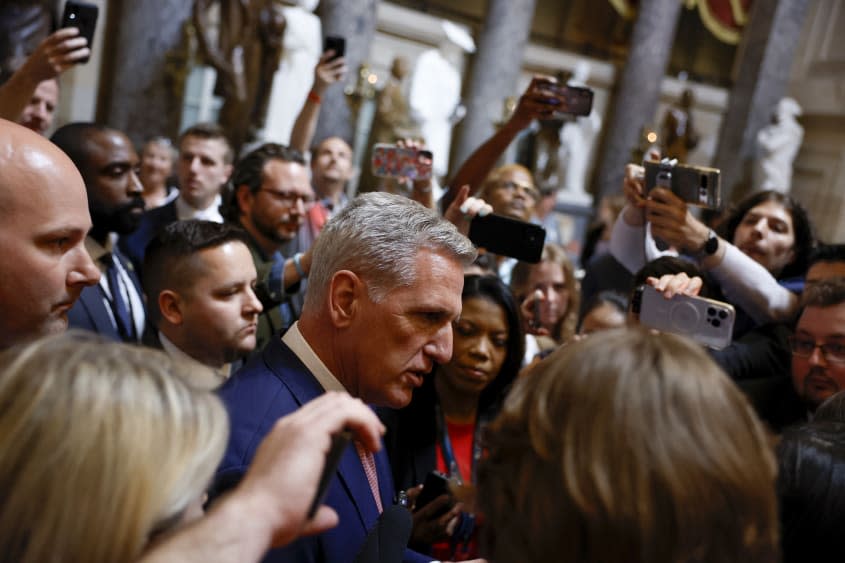Kevin McCarthy's last-minute debt ceiling drama

- Oops!Something went wrong.Please try again later.
When Rep. Kevin McCarthy (R-Calif.) was elected speaker of the House after a grueling series of votes to solidify his fractious congressional majority, he did so thanks in part to a negotiated agreement that empowered his party's most extreme conservatives to oust him from his leadership perch at a moment's notice through a process called the "motion to vacate." Just months later, McCarthy is facing a growing chorus of angry voices from that same far-right faction — and beyond — that not only threatenes to scuttle a nascent debt ceiling deal he and White House officials agreed upon, but could see his leadership challenged on the same grounds that allowed him to grasp the gavel.
What's the drama?
Members of the ultra-conservative House Freedom Caucus argue that a deal to both raise the current debt limit and cut government spending by at least an estimated $1 trillion over the coming decade doesn't go far enough compared to the narrowly passed — but largely symbolic – bill passed in the House in late April, which featured much more aggressive spending cuts. After the tentative agreement between McCarthy and the Biden administration was announced, a number of Republicans trashed the deal as "an insult to the American people" that would "kick the can down the road at the expense of our kids and grandkids." Even South Carolina Rep. Nancy Mace, a far-right conservative who has positioned herself as a party moderate of late, blasted the proposed legislation as the product of a "broken" Washington in Republicans were "outsmarted by a president who can't find his pants."
Those intra-party tensions reached a fever pitch as members of the Freedom Caucus began openly insinuating that McCarthy's speakership could be a casualty of any effort to push through a bill so deeply unpopular with his right flank.
With a reference to the "power sharing arrangement" between McCarthy and the Freedom Caucus that convinced the latter to support the former for the speakership, Rep. Chip Roy of Texas called the White House/McCarthy deal a "betrayal" that would force a number of his peers to "regroup and figure out the whole leadership arrangement again."
Fellow Freedom Caucus member Rep. Dan Bishop (R-N.C.) was even more assertive in his threats to McCarthy, predicting "war" while confirming to Politico that he would "absolutely" consider using a motion to vacate on the speaker as a result, calling it "inescapable."
What's next?
McCarthy insists neither the bill nor his leadership are at serious risk. But the schism between the members of his party willing to negotiate with Democrats and those who are threatening to reject all but the hardest of lines presents a major problem for the speaker. After all, his majority is already tenuous. With so many Republicans publicly committed to voting against the bill when it comes to the House floor, McCarthy will almost certainly have to rely on a significant number of Democrats to help get the legislation over the finish line — something a number of Democrats have indicated they will do. But this would render him even weaker within his own party. "I don't think that'd be a good look, let's just put it that way," Rep. Andy Biggs (R-Ariz.) told Axios.
Bishop encouraged other Republicans to step forward and block the bill and to ensure "there is any path to salvaging what we began as a unified conference." That suggested the defectors were lacking enough "nay" votes to fully stop the bill from moving to the Senate, The Washington Post noted, but also suggested Bishop and his colleagues were not merely willing to see McCarthy in an uncomfortable legislative bind, but eager. Even if the bill passes, McCarthy's stature will be diminished, placing him at further risk for future rebellions and efforts to oust him.
You may also like
Air New Zealand to weigh international passengers as part of safety survey
Thousands flock to Missouri to see body of nun who died in 2019

